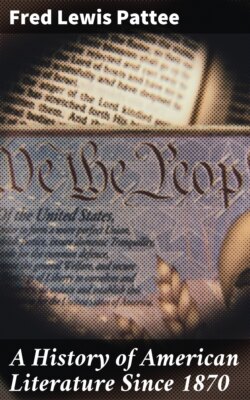Читать книгу A History of American Literature Since 1870 - Fred Lewis Pattee - Страница 6
На сайте Литреса книга снята с продажи.
II
ОглавлениеTable of Contents
But the change wrought by the war was far more than a rise of new activities and a shifting of population. A totally new America grew from the ashes of the great conflict. In 1860, North and South alike were provincial and self-conscious. New York City was an enormously overgrown village, and Boston and Philadelphia and Charleston were almost as individual and as unlike one another as they had been in the days of the Revolution. There had been nothing to fuse the sections together and to bring them to a common vision. The drama of the settlement had been fierce and piteous, but it had been a great series of local episodes. The Revolution had not been a melting pot that could fuse all the sections into a unity. The war which had begun in New England had drifted southward and each battle, especially toward the end, had been largely a local affair. Until 1860, there had been no passion fierce enough to stir to the very center of their lives all of the people, to melt them into a homogeneous mass, and to pour them forth into the mold of a new individual soul among the nations. The emphasis after 1870 was not upon the State but upon the Nation. As early as 1867 a writer in the North American Review declared that, "The influence of our recent war in developing the 'National Sentiment' of the people can hardly be overestimated."[3] Now there came national banks, national securities, a national railroad, a national college system—everywhere a widening horizon. Provincialism was dying in every part of the land.
Until 1860, America had been full of the discordant individuality of youth. Its characteristics, all of them, had been characteristics of that turbulent, unsettled period before character had hardened into its final form. From 1820 to 1860 the nation was adolescent. In everything at least that concerned its intellectual life it was imitative and dependent. It was in its awkward era, and like every youth was uncouth and sensitive and self-conscious. It asked eagerly of every foreign visitor, "And what do you think of us?" and when the answer, as in the case of Moore or Marryat or Dickens, was critical, it flew into a passion. It was sentimental to silliness. As late as 1875 the editor of Scribner's declared that a large number of all the manuscripts submitted to publishing houses and periodicals were declined because of their sentimentality, and most of the published literature of the time, he added, has "a vast deal of sentimentality sugared through it." That was in 1875; a few years before that date Griswold had published his Female Poets of America, and there had flourished the Token, the Forget-Me-Not, and the Amaranth. Adolescence is always sad:
And I think as I sit alone,
While the night wind is falling around,
Of a cold white gleaming stone
And a long, lone, grassy mound.
The age had sighed and wept over Charlotte Temple, a romance which went through edition after edition, and which, according to Higginson, had a greater number of readers even in 1870 than any single one of the Waverley Novels.
But even as it sighed over its Charlotte Temple and its Rosebud and its Lamplighter, it longed for better things. It had caught a glimpse, through Irving and Willis and Longfellow and others, of the culture of older lands. America had entered its first reading age. In 1844 Emerson spoke of "our immense reading and that reading chiefly confined to the productions of the English press." In its eagerness for culture it enlarged its area of books and absorbed edition after edition of translations from the German and Spanish and French. It established everywhere the lyceum, and for a generation America sat like an eager school-girl at the feet of masters—Emerson and Beecher and Taylor and Curtis and Phillips and Gough.
But adolescent youth is the period, too, of spiritual awakenings, of religious strugglings, and of the questioning and testing of all that is established. For a period America doubted all things. It read dangerous and unusual books—Fourier, St. Simon, Swedenborg, Jouffroy, Cousin. It challenged the dogmas of the Church. It worked over for itself all the fundamentals of religion. A reviewer in the first volume of Scribner's remarks of the fall books that, as usual, theology has the best of it. "Our poets write theology, our novels are theological … even our statesmen cannot write without treating theology."[4] The forties and fifties struggled with sensitive conscience over the great problems of right and wrong, of altruism and selfish ambition. The age was full of dreams; it longed to right the wrongs of the weak and the oppressed; to go forth as champions of freedom and abstract right; and at last it fought it out with agony and sweat of blood in the midnight when the stars had hid themselves seemingly forever.
The Civil War was the Sturm und Drang of adolescent America, the Gethsemane through which every earnest young life must pass ere he find his soul. He fails to understand the spirit of our land who misses this great fact: America discovered itself while fighting with itself in a struggle for things that are not material at all, but are spiritual and eternal. The difference between the America of 1850 and that of 1870 is the difference between the youth of sixteen and the man of thirty. Before the war the bands of America had played "Annie Laurie" and "Drink to Me only with Thine Eyes"; after the war they played "Rally round the Flag" and "Mine Eyes have Seen the Glory of the Coming of the Lord."
